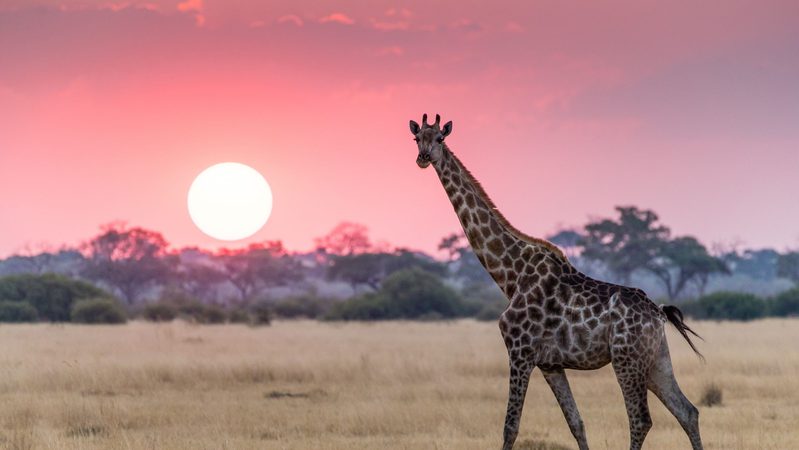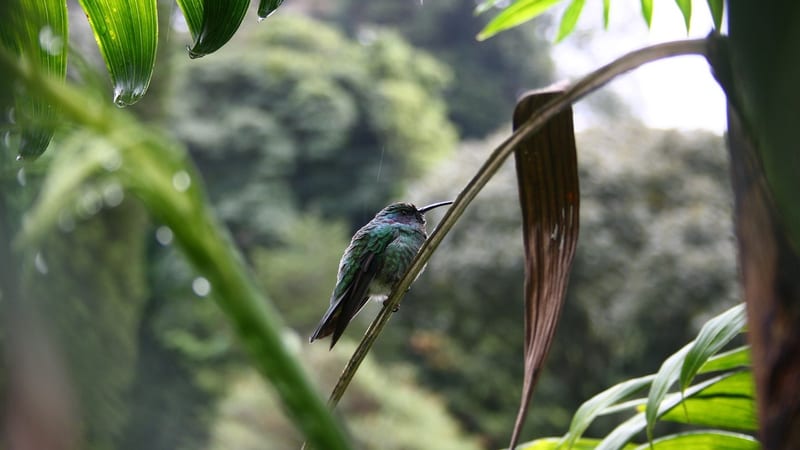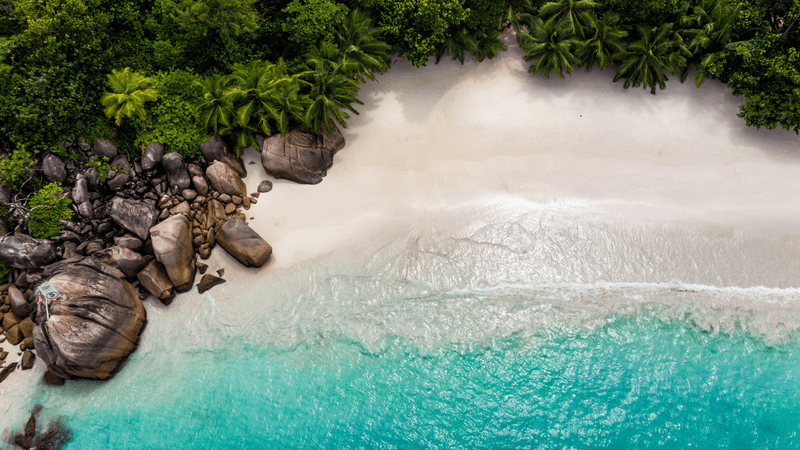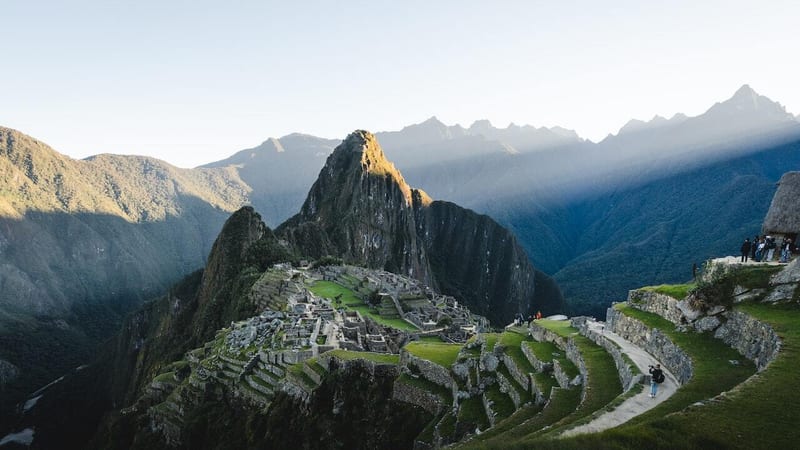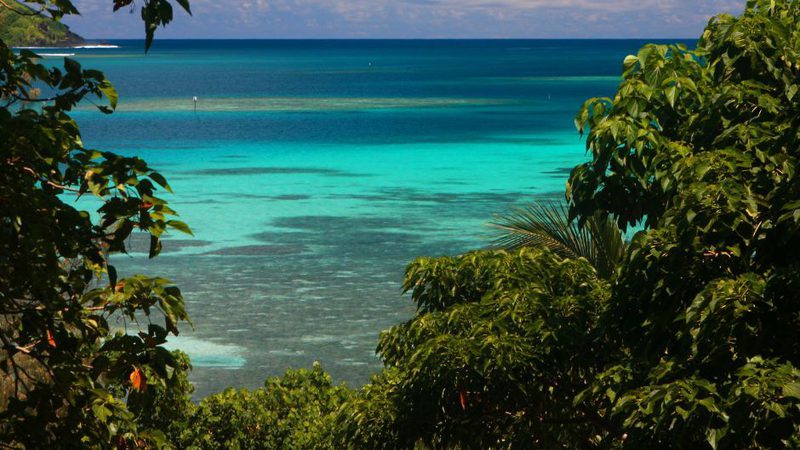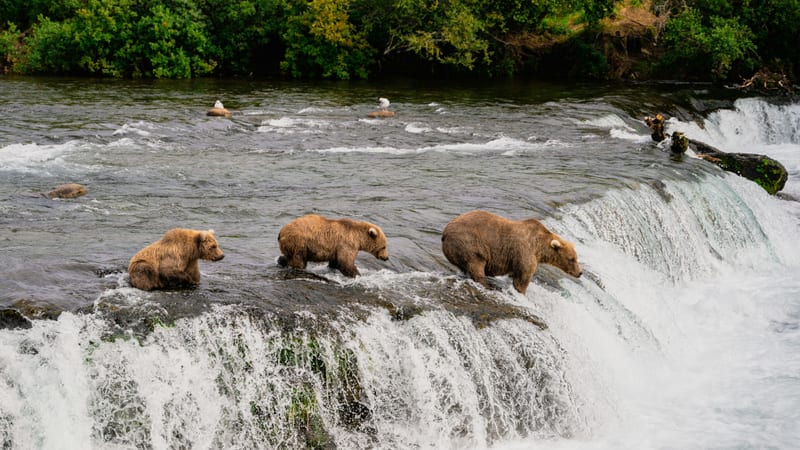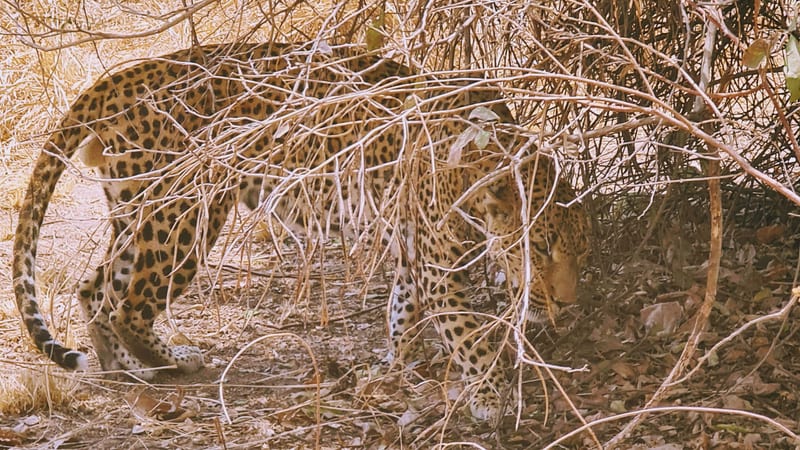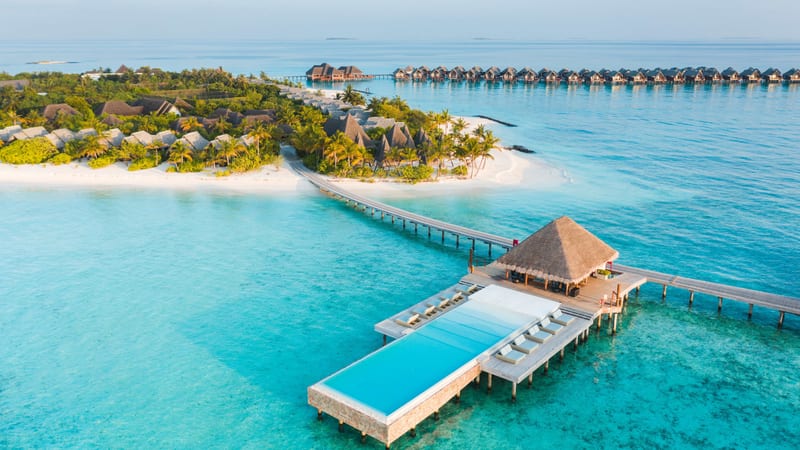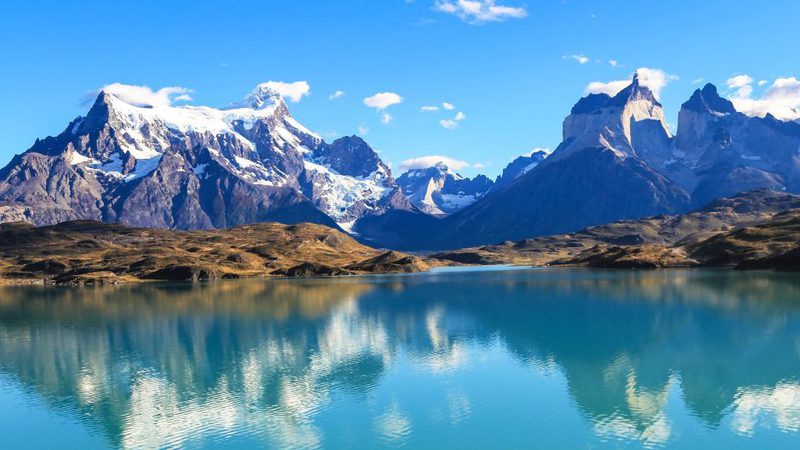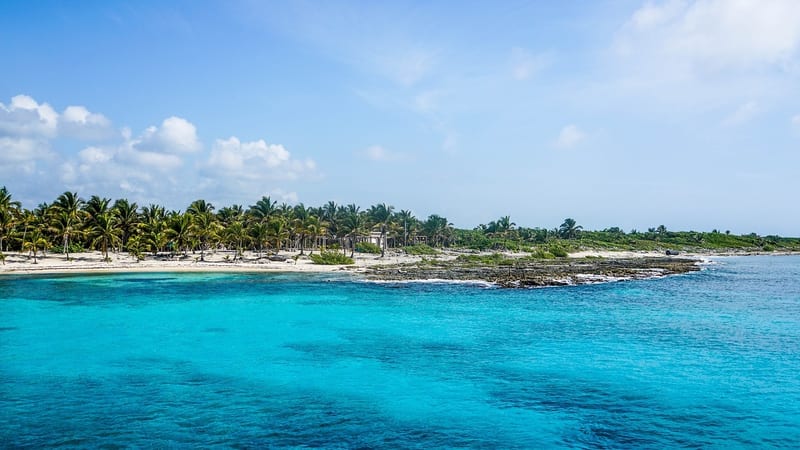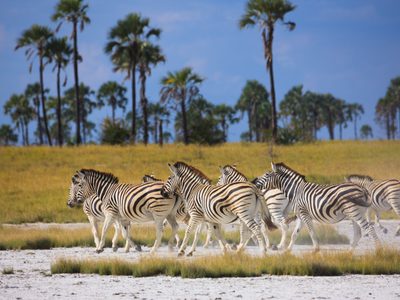
The vast Makgadikgadi Pans may not yet feature on Botswana’s typical tourist trail, but this remarkable salt flat in the south-east of the Okavango Delta offers a unique landscape and wildlife seldom seen elsewhere in Botswana.
Readily accessible from the town of Maun, it can easily be included in a safari with the more well-known Okavango and Chobe regions – and anyone who knows Northern Botswana will tell you that it is well worth a visit.
One of the world’s largest salt flats, it is the remains of an ancient lake – perhaps not a destination that springs to mind when thinking of Botswana, but it is often suggested as a must-see destination for visitors nevertheless.
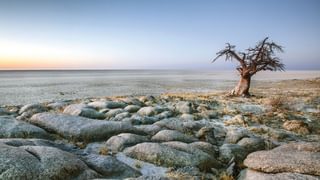
Why visit the pans versus other spots in Botswana?
The usual itineraries for an initial glimpse at Botswana tend to follow the same route – fly into the Okavango Delta, see the waterways of this famous wetland and experience game-viewing with a difference from the water, by boat or traditional dug-out canoe. Head to the Okavango’s open plains or woodlands and partake in the game-viewing for which the area is famous, ending the trip on the Chobe River seeing the herds of grazers that cover the flood plains that appear once the river subsides.
Occasionally, we may imagine the Kalahari skies and think of a visit to the grassy plains of the desert, but Makgadikgadi remains a mysterious, lesser-known destination that should be on every visitor’s itinerary – whether new or returning to Botswana.
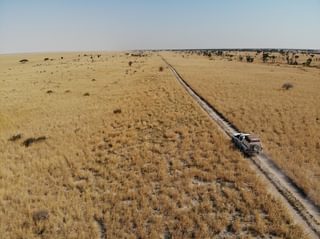
The pans – as they are affectionately known by those of us lucky enough to live nearby – are a contrast to what is expected when one thinks of Botswana. It is this contrast of wildlife, open spaces and the experiences on offer that makes the Makgadikgadi so appealing. The miracle of the Okavango Delta’s lifegiving floods are better understood after visiting the pans, which are the remnants of the lake that the Okavango once fed. The Delta is somehow greener and lusher after crunching over this desiccated surface.
The uninterrupted views, dotted by palms, introduce you to the flat expanse of Northern Botswana that is less obvious in the reed channels of the Delta. The Makgadikgadi offers a raw, stark comparison to what other Botswana safari regions offer in wildlife sightings, landscape and experience.
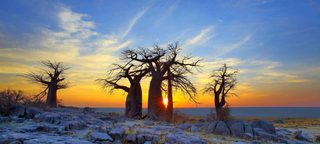
What is the pans experience like?
This is a place that challenges the definition of safari and focuses and delivers on experience. The space that Botswana offers is nowhere more obvious than in the Makgadikgadi – vast and open, it has a poppadum-like salt crust that snaps with a satisfying crunch with each step. It is both freeing and frightening to stand on a pan and see the horizon stretching out all around you.
There is nothing quite like the buzz of the silence in the Makgadikgadi, a silence so deep that it has a sound. The guides who live here encourage you to experience it for yourself and it is not unusual to feel unsettled while sitting without external stimulus and nothing but the gentle breeze, the sky’s changing colours and the sound of your own breathing.
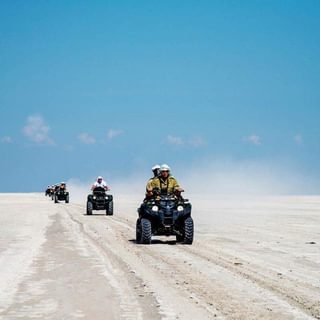
The pans have a long geological and archaeological history that is almost tangible. There is something about the vastness of the space that makes you feel part of the ancient timeline of humanity. It is both a primitive awareness of our own insignificance and responsibility to our forefathers.
The culture of the Makgadikgadi is a key reason to visit. Its history is quietly echoed in the stone tools found on the pan; in the branches of an ancient baobab once put to paper by early colonial artists and now collapsed and returning to the earth; in the ease at which the San guides trace tracks in the sand and pull poisonous grubs out of holes, dig up scorpions and track secretive wildlife. A visit to this landscape truly is a lesson in humility. It takes little time to appreciate how vulnerable we would be in this challenging environment without the gentle care and guidance of the people who are so at ease out here.
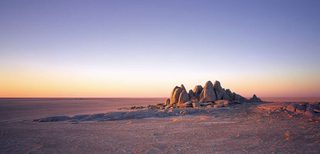
The vast skies also reduce your self-importance and challenge your sense of the world. While impressive at any time due to the absence of light pollution, it is when lying under a moonless sky, shortly after the rains and before the dust has started to grey the sky, that it is most remarkable – to lie under a dome of stars so bright is truly magical. When the moon is out, the stars remain significant, but the shadows created on the moonlike crust of the pans is an out-of-this-world experience. Add the vast space and quiet and there is nowhere to hide from yourself. It is here, under a starlit sky, that you most appreciate the scale of our galaxy and our position in the cosmos.
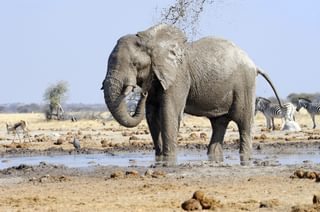
What animals can be seen in the Makgadikgadi area?
A visit to the Makgadikgadi is not all philosophical moments and introspection, however. The pans are also home to unique species not easily seen elsewhere in Botswana. Desert-adapted species abound and it may be the only possibility of a springbok sighting you have on a Botswanan safari. Rare and shy nocturnal species are also found on night drives, or for those up with the dawn, creatures such as bat-eared foxes, brown hyena, aardwolf and aardvark.
It is not all rare and unusual species, though, and predators are enticed into the area with the migration of zebra and wildebeest in the summer months. Both lion and cheetah can be found regularly. Elephants have also become a more regular sighting with the introduction of pumped pans in the area.
The superstar animal sighting of the area goes to the meerkats, however. These characterful creatures are gregarious and live in colonies. A local gang are carefully and sensitively habituated to people, which allows you to follow them as they start their day and look for their next meal. Spending time with these creatures gives you a chance to experience their world and marvel at their senses in action, looking for eagles, listening to alarm calls and scenting out a scorpion snack, while also experiencing their relationships with one other and their environment.
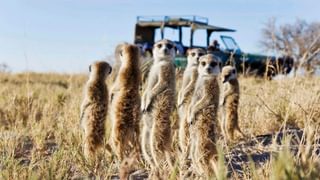
This fascinating and enjoyable experience is a highlight of a visit to the area, most notably due to their self-determined interaction with you. Meerkats will always look for the highest point in the area to use as a lookout post – visitors who are patient and still can be rewarded by being climbed, albeit in a rather undignified manner, by a meerkat sentry, which makes for highly entertaining and Instagram-worthy photo opportunities.
Birdlife abounds and the most attractive of the feathered inhabitants are the flamingos – both lesser and greater – that flock to the area for breeding. Breeding and formation of their mud nests is seldom seen on the main Makgadikgadi pans accessible by road, but birds are seen in the area through the breeding season. The national bird of Botswana, the kori bustard, is also a regular sight, as are ostrich and the noisy northern black korhaan. Specialist birders are sure to tick off desert-adapted and grassland birds, too.
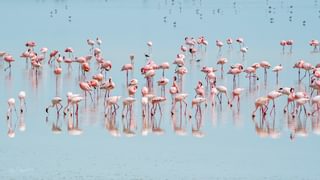
Where can I stay?
Birding, game-viewing, pan excursions and starry night skies are enough of a reason to visit this remarkable area, but Unchartered Africa – which operates three immaculate camps in the area – takes the experiences on offer even further. These camps – Jack’s Camp, San Camp and Camp Kalahari – can all be booked through us.
Being the only permanent camps here, they offer unrivalled access to the pans and Unchartered Africa is an expert in experiential travel. The camps were developed on the back of special touches, having been unable to rely on wildlife to sell their offerings before wildlife returned in the numbers it has following their careful conservation of the area. A fascinating and character-filled family history and deep ties to the area means that your stay will feel unique and valuable to everyone you meet. While some activities are seasonal and the pan cannot be traversed in the rainy season (December to April), a special experience will be had no matter what the time of year.
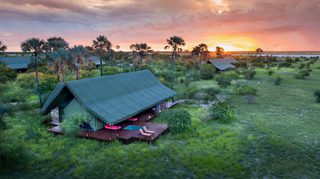
If you are looking for multiple experiences where no activity need be repeated, then this is the place for you. With offerings including quad bikes across the pan crust, horseback safaris through zebra herds, helicopter flights over the pan’s expanse, walking with bushman guides through the grasslands, dining by starlight, sleepouts and private sundowners, there is ample stimulation to occupy your time.
If you prefer to gaze out over the smaller pans that surround the camps or lounge by the pool, you will also find yourself being spoiled and looked after by a team who are masters of hospitality.
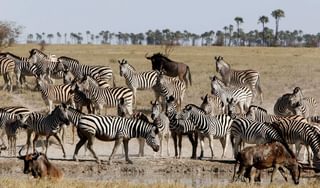
While the three camps differ, all offer an array of activities and wildlife experiences, meaning that you cannot go wrong no matter which of the trio you choose to visit. All are focused on making the Makgadikgadi come to life and unearthing the soul-stirring magic of the place.
Get in touch with us to put this must-visit destination into your Botswana itinerary and to determine which of these unique and differentiated camps is the best fit for you.
Tessa is one of our guest bloggers. Based in Maun, she has worked in the safari business for several years and is passionate about the nearby Makgadikgadi Pans.

